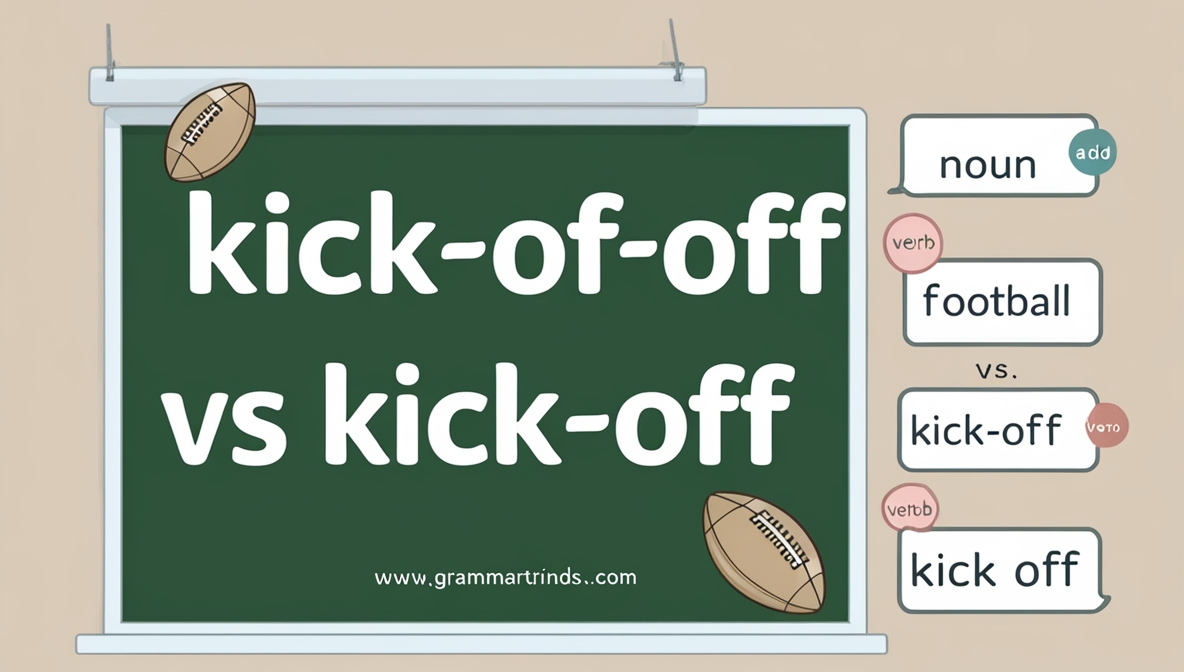Confused by the terms kickoff vs. kick-off vs. kick off? You’re not alone. These similar-looking phrases often trip people up, especially when writing about the start of something like a football game, a meeting, or a new project. The difference lies not just in spelling, but also in grammar, meaning, and regional usage especially between British English, American English, and Canadian English. Let’s clear it up once and for all.
Kickoff, Kick-off, and Kick Off – What’s the Actual Difference?
The difference between kickoff, kick-off, and kick off comes down to how they function in a sentence: whether they’re used as a noun, verb, or adjective. Each form serves a unique grammatical purpose and appears in specific contexts. Here’s a quick overview:
| Form | Part of Speech | Use Case | Example |
|---|---|---|---|
| Kickoff | Noun | A specific event or starting point | The kickoff is at 3 PM. |
| Kick-off | Noun/Adjective | Variant spelling (mainly British) | The kick-off meeting went well. |
| Kick off | Verb phrase | Action of beginning something | We’ll kick off the event at noon. |
When to Use “Kickoff”
“Kickoff” (one word) is a closed compound noun commonly used in American English to refer to the start of a meeting, sporting event, or campaign. It names the inaugural event, not the action.
It’s best used when referring to:
- The event kickoff time
- A kickoff party
- The initial stage of a launch
✅ Example Scenarios:
- The kickoff for the new marketing campaign is on Monday.
- Don’t miss the kickoff of the football season tonight.
🔍 Tip:
Think of kickoff as something you attend or schedule, not something you do.
📚 Synonyms:
- Start
- Beginning
- Launch
- Opening event
When to Use “Kick-off”
“Kick-off” with a hyphen is technically correct but is more common in British English and sometimes Canadian English. It’s used the same way as “kickoff”—as a noun or adjective but with hyphenated spelling.
You’ll often see this form in:
- UK newspapers and sports commentary
- Formal or older texts following British vs. American usage standards
✅ Example Scenarios:
- The kick-off time for the match is 8 PM.
- We’re having a kick-off meeting with the new client.
🔍 Tip:
If you’re writing for a British audience, the hyphenated form may be preferred—especially in sports terminology or official documents.
When to Use “Kick off”
“Kick off” (two words) is a phrasal verb that means “to begin or commence something.” This form emphasizes the action rather than the event itself.
✅ Example Scenarios:
- Let’s kick off the weekend with a happy hour.
- The concert will kick off at 9 PM.
- They kicked off the show with a dance performance.
🔍 Tip:
Use this form when the phrase acts like a verb. Remember, phrasal verb meaning always uses the separated phrasal verb form.
📚 Synonyms:
- Begin
- Launch
- Start
- Commence
Regional Differences: British, American, and Canadian English
English usage varies by region, and this is no exception. The preferred form changes depending on where you are.
| Region | Common Form(s) Used | Notes |
|---|---|---|
| American English | Kickoff (noun), Kick off (verb) | Kickoff is the standard for events or nouns |
| British English | Kick-off (noun), Kick off (verb) | Hyphenation is preferred in many UK publications |
| Canadian English | Mixed: Kickoff and Kick-off | Some follow American usage, others stick to British |
“Kick off” as an Idiom? Yes, Definitely.
The phrase “kick off” is also an idiomatic expression, especially in casual conversation or sports terminology. It carries a figurative meaning, much like “get the ball rolling” or “fire up.”
✅ Example Idioms in Use:
- The debate really kicked off when taxes came up.
- Let’s kick off this project with something exciting.
Sometimes, kick off even carries different meanings:
- Remove by kicking: He was kicked off the team.
- Online disconnection: The user was kicked off the server.
- Slang for dying: He kicked off last night.
Tips to Remember the Difference
- 🧠 If it’s a thing or event, use kickoff (noun)
- 🏃 If it’s an action, use kick off (verb phrase)
- 🇬🇧 Use kick-off in British or formal Canadian writing
- ✍️ Follow your style guide (e.g., AP Stylebook) for consistency
Common Confusions and Grammar Differences
| Confusion Point | Incorrect Example | Corrected Example | Explanation |
|---|---|---|---|
| Using kickoff as a verb | Let’s kickoff the show. | Let’s kick off the show. | Kickoff is a noun, not a verb |
| Forgetting hyphen in UK English | The kick off meeting was helpful. | The kick-off meeting was helpful. | Use hyphen in adjective form |
| Misplacing adjective form | Kick off session is at 10. | The kickoff session is at 10. | Use noun/adjective form properly |
FAQs
Is “kickoff” one word or two?
If you’re using it as a noun, it’s one word kickoff. If it’s a verb, use kick off.
Which is more correct kickoff or kick-off?
Both are correct. Kickoff is more common in American English; kick-off appears more in British English.
Can “kickoff” be used as a verb?
No. Use kick off (two words) when using it as a verb phrase.
Final Thoughts
Whether it’s a kickoff party, a kick-off meeting, or time to kick off your day, knowing which form to use will keep your writing polished and professional. The key is recognizing whether you’re describing an event, an action, or following regional spelling rules. Keep it simple: noun = kickoff, verb = kick off, and if you’re writing for a UK audience, a hyphen may still be welcome.
Let this be your kickoff to clearer writing.
